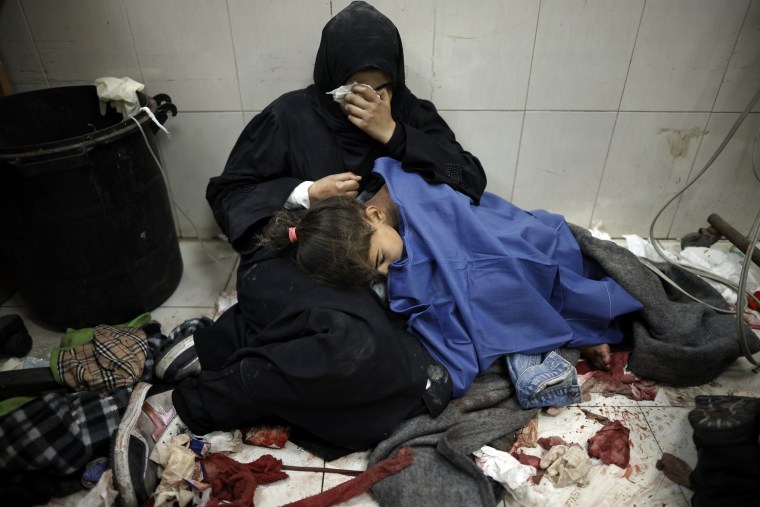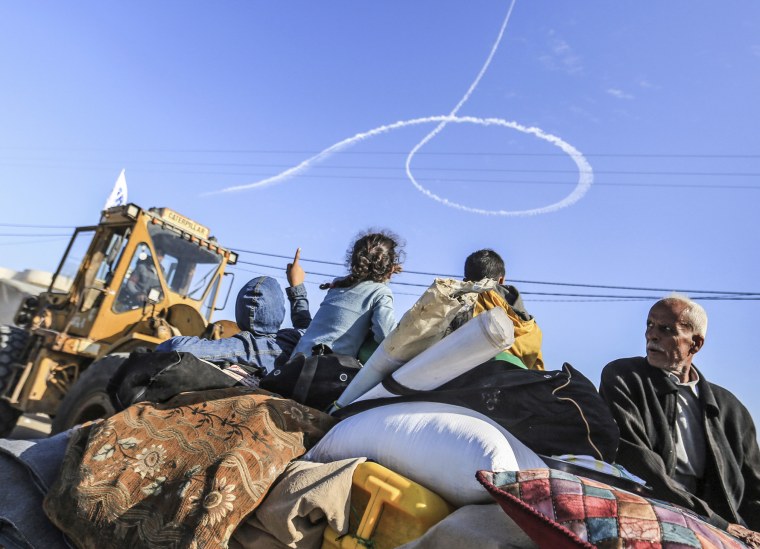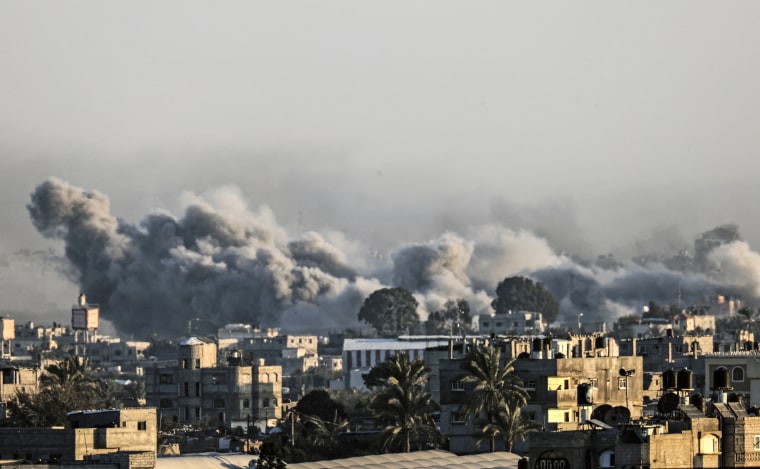TEL AVIV — Israeli forces said Monday they were deepening their ground offensive “to the west” of Khan Younis in southern Gaza, and Palestinian health officials said the forces had stormed one hospital and engaged in heavy fighting near another.
Dozens of people were killed and injured, and thousands were forced to flee as Israeli forces maneuvered through western Khan Younis before allegedly storming Al Khair hospital, west of the city, Gaza health ministry spokesman Ashraf Al-Qudra said in statements Monday.
The Palestine Red Crescent Society also warned in a post on X on Monday of an “extremely dangerous” situation around Al Amal Hospital in Khan Younis, where it said ambulance teams were struggling to reach patients because of the “continuous bombardment.”
Al-Qudra said earlier in the day that at least 50 people had been killed and more than 100 injured in the area of Khan Younis.
Dr. Nahud Abu Taima, the director of surgery at Al Nasser, a major hospital in Khan Younis, provided NBC News with the same death toll.
Abu Taima said there was an “acute shortage” of supplies to treat the injured and warned the hospital could become “a repeat of the scenario that occurred in hospitals in the northern and central Gaza Strip.”
NBC News was not able to independently verify the number of casualties or the exact situation on the ground.

Reports of violence around hospitals in southern Gaza sparked alarm among human rights and health officials.
“We are deeply concerned by reports of continuous fighting in the vicinity of Al-Amal Hospital, and today’s raid at Al-Kheir Hospital in Gaza are deeply worrisome,” World Health Organization Director-General Tedros Adhanom Ghebreyesus wrote on X.
“This must end,” he said.
In a briefing Monday, White House National Security Council spokesman John Kirby said Israel has a right to defend itself, but he said he expected its forces to do so “in accordance with international law and to protect innocent people in hospitals, medical staff and patients as well, as much as possible.”
In a statement shared with NBC News, the IDF said it was deepening its ground maneuver “to the west” of Khan Younis and reiterated allegations that Hamas “embeds itself in the civilian population” and “sites such as hospitals and schools.”
The IDF did not respond to questions about whether forces were operating at or around the Al Khair or Al Amal hospitals.

A U.S. doctor in Gaza as part of a mission to provide medical care to civilians said it was a “horrible day” in the enclave as he described a “mass exodus” of people fleeing south from Khan Younis and Al-Mawasi, which is southwest of Khan Younis. Reuters reported that troops had advanced into the Al-Mawasi district, near the Mediterranean Coast, “for the first time.”
Al-Mawasi has been considered a humanitarian zone where civilians can seek relative safety.
The IDF did not respond to specific questions about whether its forces were operating in Al-Mawasi, but said “Al-Mawasi is considered a safer zone.”
“Roads are crowded with families leaving by all means,” said Dr. Zaher Sahloul, president of MedGlobal, an organization that provides medical help during humanitarian crises.
He said that most medical staff and patients had fled the Al Nasser hospital and that patients who had been rushed into the facility with fresh injuries had “no staff to treat them.”
In video captured by NBC News’ crew on the ground, families could be seen fleeing Khan Younis further south toward Rafah in search of relative safety as clouds of dark smoke billowed into the sky. Many carried what few possessions they managed to flee with, while others cradled babies in their arms.
“They’re destroying us,” Ayad Abed said as she was pushed down the road in a wheelchair, with a baby bundled in her arms.

The infant, she said, was her grandchild. ‘They killed my daughter-in-law,” she said, referring to the baby’s mom.
Abed said her family lived in Khan Younis near Al Nasser hospital and they were forced to flee after bombs dropped “all night … it didn’t stop even one minute.”
Outside, her home, she said, there were “bodies everywhere in the street. Tens of bodies in the street.” Now, she and her family just hoped to make it to Rafah.
Back home, she said: “There’s nothing left for us now.”






